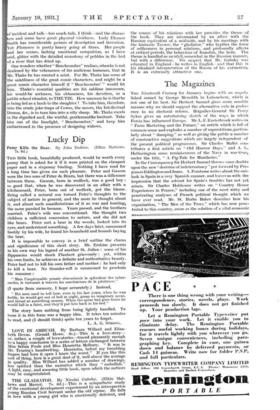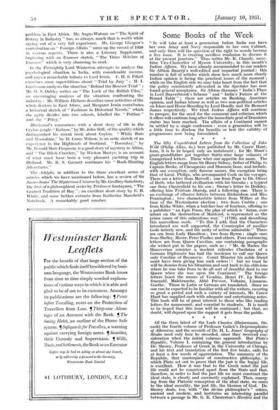The Magazines Tim Nineteenth Century for January begins with an
unpub- lished sonnet by George Meredith to Labouchere; which is not one of his best. Sir Herbert Samuel gives some sensible reasons why we should support the alternative vote in prefer- ence to no electoral reform. Brigadier-General Sir Percy Sykes gives an entertaining sketch of the ways in which Persia has influenced Europe. Mr. L. F. Easterbrook writes on " Farm Marketing and the Future," an article which is full of common sense and explodes a number of superstitions, particu- larly about " dumping," as well as giving the public a number of constructive suggestions which arc largely independent of the present political programmes. Sir Charles Mallet con- tributes a first article on " Old Harrow Days," and A. L. Hetherington some reminiscences of the Navy in war-time, under the title, " A Pig-Tale for Mandarins."
In the Contemporary Sir Herbert Samuel throws some doubts upon the new " doctrine of indeterminacy" put forward by Pro.. fessorsEddingtonandJeans. A. Fombona writes about the out- look in Spain in a very Spanish manner, and leaves us with the impression that the solvent for Spain's troubles has not yet arisen. Sir Charles Hobhouse writes on " Country House Experiences in France," including one of the most witty and . penetrating analyses of French political thought which we have ever read. Mr. St. Barbe Baker describes how his organization, " The Men of the Trees," which has now pene- trated to this country, arose as the solution of a vital economic' problem in East Africa. Mr. Angus Watson on " The Spirit of Rotary in Industry " has, as always, much that is worth while saying out of a very full experience. Mr. George Glasgow's contribution on " Foreign Affairs " sums up the record of 1930 in various aspects. There is also a Literary Supplement, beginning with an Exmoor sketch, "The Three Witches of Exmoor," which is very charming to read.
In the Fortnightly Lord Winterton attempts to analyse the psychological situation in India, with considerable success, and pays a remarkable tribute to Lord Irwin. C. H. S. Fifoot examines some superstitions about " Trial by Jury " ; M. I. Ganfmann analyses the situation " Behind the Moscow Trial " ; Mr. I I. S. Oakley writes on " The Luck of the British Film," an encouraging analysis of the situation confronting the industry ; Mr. William Hichens describes some activities of the witch doctors in East Africa, and Margaret Irwin contributes a historical sketch of " Fashions in Historical Novels," which she aptly divides into two schools, labelled the " Prithee " and the " Privy."
Bloch-wood's commences with a short story of life in the Ceylon jungle, " Kabara," by Mr. John Still, of the quality which distinguished his recent book about Ceylon. " White Rats and Moonshine," by D. Canis Wilson, is an eerie sketch of an experience in the Highlands of Scotland. " Bocankey," by Mr. Ronald Muir-Ferguson, is a good story of mystery in Africa, and " The Ditch Crawlers," by Weston Martyr, is an account of what must have been a very pleasant yachting trip in Holland. Mr. R. S. Garnett continues his " Book-Hunting Adventures."
The .4delphi, in addition to the three excellent series of articles which we have mentioned before, has a review of Sir James Jeans' The Mysterious Universe by Mr. Geoffrey Sainsbury, the lirst of a philosophical series by Professor Santayana, "The Genteel Tradition at Bay " ; an excellent short story by E. B. White, and some further extracts from Katherine Mansfield's Notebook. A remarkably good number.



































 Previous page
Previous page